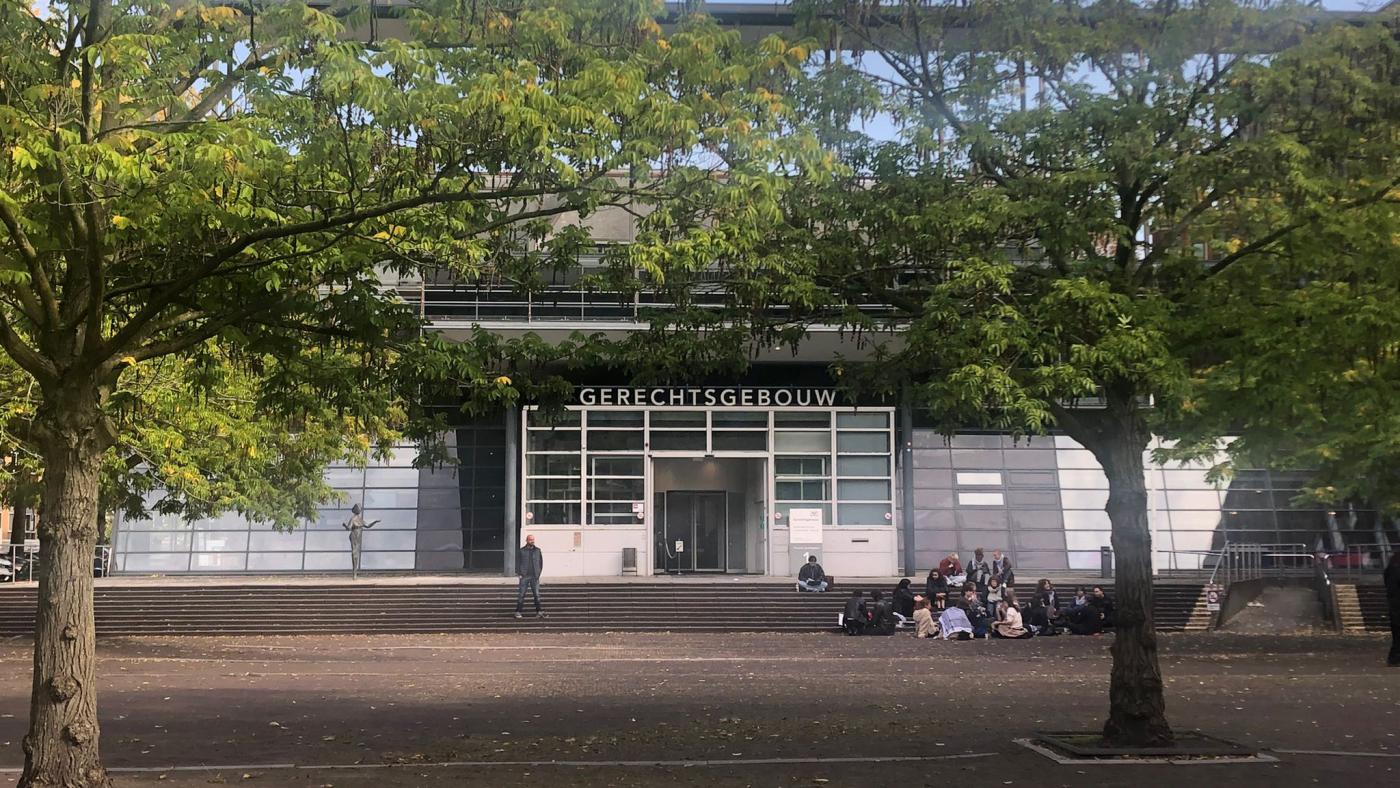She sprayed slogans on UU building
Pro-Palestine protester gets prison sentence

The student is on trial for spraying a protest slogan on one of the university buildings on Drift during a protest march. On June 25, about a hundred students and employees participated in a protest, walking from Jaarbeurs Square to Drift. The goal was to convince Utrecht University to cut ties with Israeli institutions. During the demonstration, the police caught the student spraying slogans on a UU building, at about 6:40 pm. The student was arrested and taken into custody for three days.
The hearing had been originally scheduled for the summer, but it was rescheduled to October at the last minute. The courtroom was surprisingly empty on Wednesday. Most supporters of the accused were waiting outside, sitting on the stairs in front of the Utrecht district court. There were about 50 protestors.
The public prosecutor demanded an official warning with a suspended fine of 250 euros, plus the cost of cleaning the door. She argues that freedom of speech and the right to demonstrate are important pillars of any democratic society but this does not mean that one can go about committing punishable offences in its name. The accused has substantially violated the university's property rights and therefore should be punished, said the public prosecutor.
Freedom of speech
The defence attorney, Willem Jebbink, lamented the hearing of this case. According to him, his client exercised her right to freedom of speech during a protest, so her actions are not a punishable offence. The fact that the case is being heard in the criminal court criminalises the expression of his client’s opinion, which, according to the defence attorney, cannot be in line with the law which guarantees the right to demonstrate peacefully.
He points to similar cases in both the Netherlands and Europe, where the Supreme Court and the European Court of Justice have ruled in the protestor’s favour. In addition, his client took full responsibility and accepted all liability due to her actions. She was willing to pay for the costs of cleaning the door.
The last word
"It is a complex conundrum," the judge acknowledged. Since freedom of speech and the right to demonstrate are at stake, one must carefully assess if the accused was expressing her opinion or committing a punishable offence by spraying graffiti on a university building.
Before the judge delivered the verdict, the accused got the last word. One more time, she tried to shed light on the suffering of the Palestinians. Before she could finish what she had to say, the judge interrupted her. "The last word is not supposed to be a political statement", the judge said. To which the defendant voiced her regret regarding how everything turned out, adding that she hoped not to have to return to court.
Property damage
After the last word, the judge reached his verdict. He considered it proven that the accused was guilty of vandalising the university's property. According to him, the nature of the student's actions called for a proper punishment. Nonetheless, he wanted to make the following clear: "I am sentencing you for damaging a building, not for expressing your opinion. Moreover, you are and were in no way being obstructed from voicing your opinion. I also want to prevent you from damaging other people’s property in the future".
The judge put the defendant’s protest in the context of several pro-Palestine protests in the Netherlands, which spiralled out of control including violence against the police and destruction of property. In his understanding, these demonstrations led to much social unrest and not imposing a proper punishment would send the wrong signal to society. The judge gave the student a prison sentence of seven days, four of which are suspended, with a probation period of two years. Since the accused has already been detained for three days, she does not have to return to jail. This sentence is in addition to the 4,023 euros in damages she will have to pay to the university to repair the door. Interestingly, the sentence is considerably higher than the public prosecutor’s demand.
Chilling effect
The defence attorney is disappointed with the verdict. "The judge wrongly took into consideration other demonstrations which included acts of violence. Besides, the European Court of Justice is crystal clear: one must be careful in cases where the freedom of speech or right to demonstrate is at stake, especially when the damages can be fully repaired". He adds that the ruling may have a chilling effect on further demonstrations in the future, which is inadmissible.
He also criticises the university's role in all of this: his client had offered to pay for all the damage costs, but UU declined. "The severity of this punishment is not appropriate, especially because my client said she will not do it again," says the attorney. The student has decided to appeal the verdict.